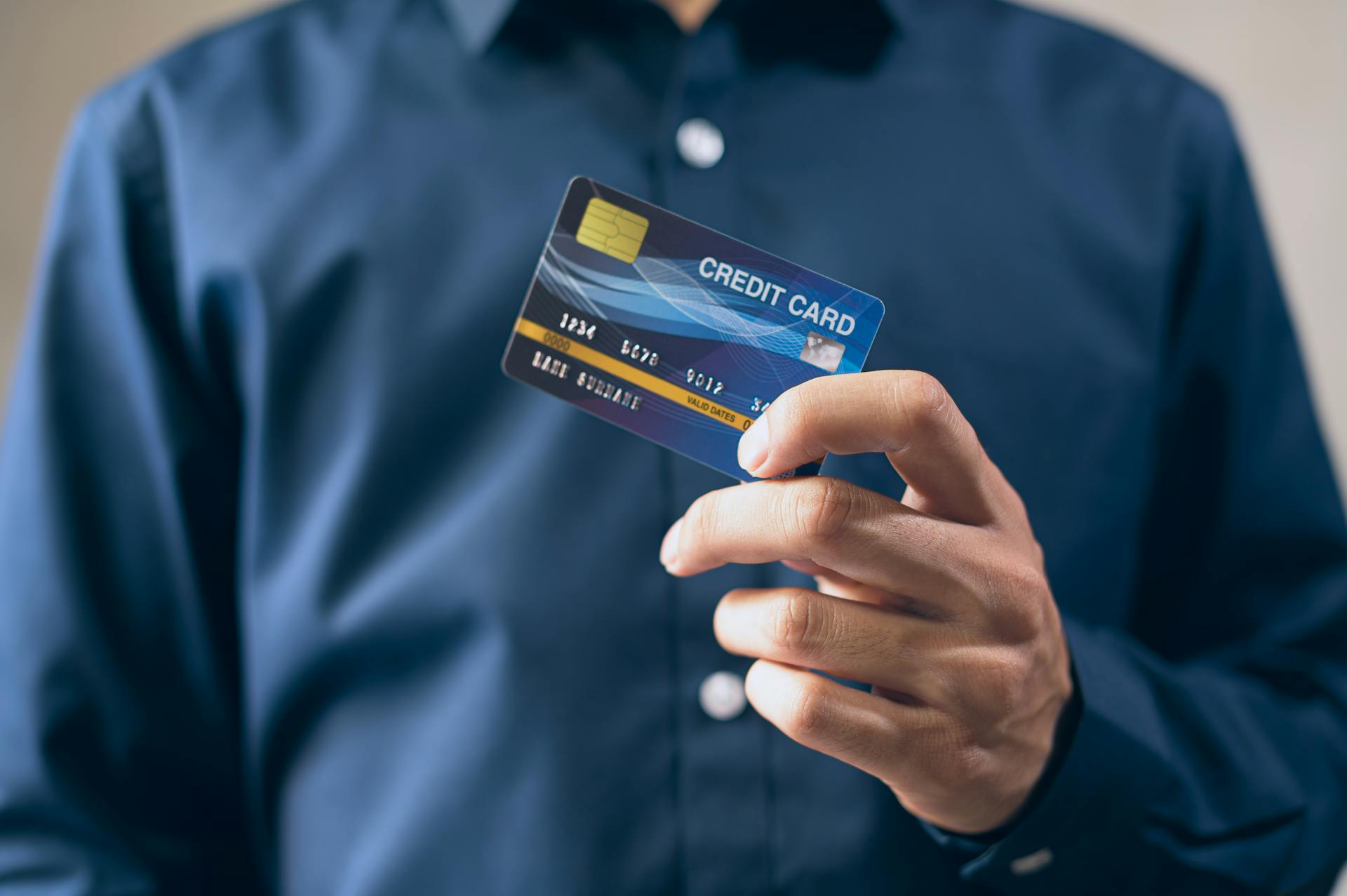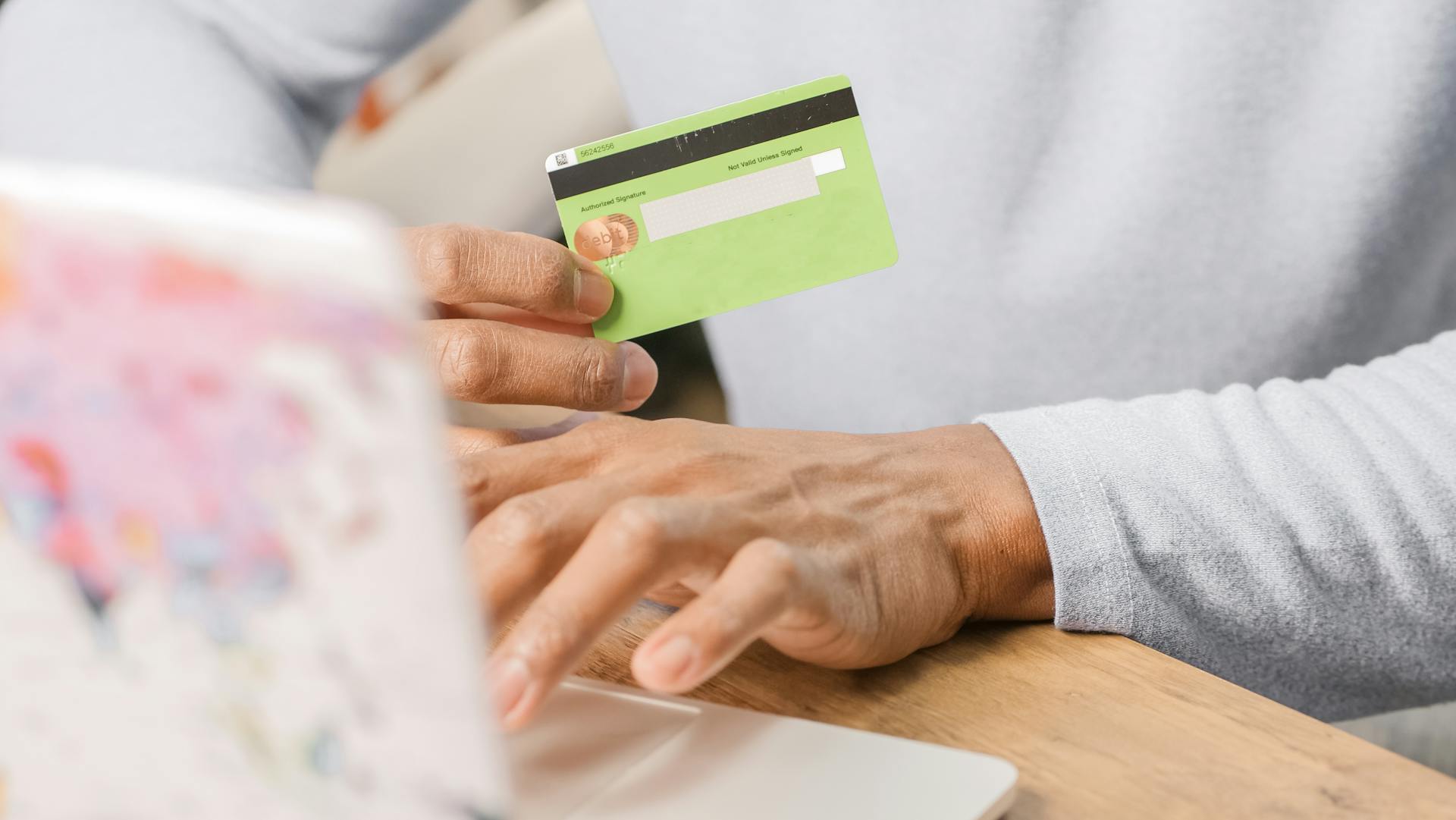
Card lock for credit cards allows you to temporarily lock your card to prevent unauthorized transactions. This feature is available with many credit card issuers.
Some issuers, like Chase, allow you to lock your card with a few taps on your mobile app. This can be a lifesaver if you've misplaced your card or are traveling abroad and don't want to risk using it.
International purchases can be a concern when it comes to card lock, but many issuers have made it easier to use your card abroad. For example, some issuers have a "travel alert" feature that lets you notify them of your travel plans, so they can be on the lookout for suspicious activity.
If you do need to lock your card, it's usually a quick and easy process. Some issuers even offer instant card lock, which can be activated in just a few seconds.
Benefits and Features
Locking your credit card can be a lifesaver in more ways than one. It can prevent impulse purchases and keep your account safe from fraud.
Most major credit card issuers offer the option to easily lock and unlock cards through their online accounts or mobile apps. This makes it easy to manage your credit card locks on the go.
Recurring transactions will still go through while a credit card is locked, which is a good thing if you have subscription payments or scheduled bill payments set up.
You can lock your credit card at any time if you don't want anyone to use it. This can be helpful if you've misplaced your card and want a chance to find it before you contact your credit card issuer.
Here are some benefits of locking your credit card:
- Prevents impulse purchases
- Keeps account safe from fraud
- Allows recurring transactions to process
Issuers and Providers
Many credit card issuers offer some type of card lock or credit card freeze. You can lock your card to prevent new purchases, cash advances, and balance transfers.
Some issuers use specific names for their card lock features, such as American Express's "freeze", Barclays' "SecurHold", and Capital One's "Card Lock." Others, like Chase, simply call it a "lock/unlock" feature.
You can easily lock and unlock your card with many issuers, including Chase, Discover, and Wells Fargo. Here are some issuers that offer card locks:
- American Express (freeze)
- Barclays (SecurHold)
- Capital One (Card Lock)
- Chase (lock/unlock)
- Citi (Quick Lock)
- Discover (Freeze it)
- Wells Fargo (Control Tower)
Issuers

Many credit card issuers offer card locks or credit card freezes, allowing you to temporarily prevent new transactions from being processed.
American Express, for example, calls this feature the "American Express freeze", which can be activated by logging into your account or using the American Express App.
You can quickly freeze and unfreeze your American Express credit card, but recurring bills and subscriptions will still be processed as usual.
Barclays offers a feature called "SecurHold", which allows you to lock your card.
Capital One's card lock feature can be accessed through the Capital One Mobile app, and locking your credit card prevents new purchases.
Chase offers a simple way to lock and unlock your credit card or debit card through the Chase Mobile app.
Citi's Quick Lock feature can be used in the Citi Mobile App or in your online account to lock and unlock your Citi credit cards.
Discover Freeze it is a feature that prevents new purchases, balance transfers, and cash advances, but recurring transactions will still occur.
If this caught your attention, see: Chase Credit Card Fraud Number

Wells Fargo's Control Tower feature allows you to temporarily turn off your credit card account, preventing most new transactions from being processed.
Some issuers automatically unfreeze your card if you don't do it within a certain timeframe, such as American Express, which will automatically unfreeze your card if you don't do it within seven days.
Here are some issuers and their card lock features:
- American Express: American Express freeze
- Barclays: SecurHold
- Capital One: Card Lock
- Chase: Lock/unlock
- Citi: Citi Quick Lock
- Discover: Freeze it
- Wells Fargo: Control Tower
International Purchases
International Purchases can be blocked directly from the TD app if you're not traveling.
You can block international in-person purchases by tapping on the "Lock Card" option in the app, which will decline in-person purchases outside of Canada like hotels and restaurants.
Online and recurring payments will still be processed even if your card is blocked.
To use your card on a trip, simply unblock it by reversing the "Lock Card" action.
A pop-up message will confirm that your card is successfully locked, with a title "Card Successfully Locked" and a description of the change.
Worth a look: What Are International Credit Cards
Managing Your Card Lock
You can lock your credit card in the TD app to prevent others from making purchases if you misplace it. This feature is also useful for preventing impulse buying or minimizing credit card debt.
According to Bankrate's Social Media Survey, 48 percent of social media users made an impulse purchase in 2023, and 68 percent said they later regretted at least one of the purchases. Locking your credit card can be a convenient way to stop poor spending habits in their tracks.
To lock your credit card, you can use the TD app, and it's a quick and easy process. Most credit card issuers allow you to manage your card locks through your online account or credit card app.
You may choose to lock your credit card for a number of reasons, including a lost card, potential credit card fraud, or to prevent impulse purchases. Here are some scenarios where you may decide to lock your card:
- You lost your credit card.
- You're concerned about credit card fraud.
- You want to curb impulse spending.
- You want to minimize another person's access to your account.
- You want to safely keep an old account active.
If you think your card has been lost or stolen, lock it and call 1-800-983-8472 right away for a replacement. If you find your card, it's just as easy to unlock it.
Declined Transactions and Limits
New online or in-store purchases are commonly blocked transactions when you lock your credit card.
Some credit card issuers may also block cash advances when you lock your card.
The effects of locking your credit card may vary depending on your credit card issuer.
Recurring autopayments, such as subscriptions and monthly bills, will typically continue to go through even if your card is locked.
Transactions that occurred before locking the card are unaffected.
Bank fees, returns, credits, interest, and rewards will also continue to process as usual.
The lock affects all cards with the same credit card number, which might affect authorized users of the card.
Some card locks or freezes remain until you unlock or thaw them, while others expire.
For example, an American Express freeze expires in seven days.
Here's a summary of declined transactions:
- New online or in-store purchases
- Cash advances
Keep in mind that the specific declined transactions may vary depending on your credit card issuer.
U.S. Banking
In the U.S., credit card issuers are required by law to report any changes in account status to the three major credit bureaus.
Credit card issuers in the U.S. can freeze credit card accounts in response to suspicious activity or to prevent unauthorized transactions.
U.S. credit card issuers often have their own policies for card lock or freeze, which may be different from the credit bureaus' policies.
The three major credit bureaus in the U.S. - Equifax, Experian, and TransUnion - also offer credit freezes, which can be done online or by phone.
Credit card issuers in the U.S. typically require cardholders to provide identification and proof of address to initiate a card lock or freeze.
A credit freeze is not the same as a credit lock, and it's not related to the card lock feature offered by some credit card issuers.
Frequently Asked Questions
Will a payment go through if I lock my card?
Locked cards will still process pending transactions and recurring payments. However, it's best to contact us for more information on how a locked card affects future transactions
Sources
- https://iet.ucdavis.edu/article/protect-yourself-credit-card-fraud
- https://www.nerdwallet.com/article/credit-cards/card-lock-how-to-use-it-strategically
- https://www.bankrate.com/credit-cards/advice/card-locks/
- https://www.capitalone.com/learn-grow/money-management/card-lock/
- https://www.td.com/ca/en/personal-banking/advice/day-to-day-banking/lock-credit-card
Featured Images: pexels.com


